How to identify and support vulnerable students

Every learner deserves a high-quality education, but some need additional support to achieve their true potential. We explain how to identify these students, and demonstrate how we’re helping them to be the best versions of themselves.
All students are unique, and the most effective methods of learning varies between individuals. This is particularly true for vulnerable students who often either need additional or differing forms of support. But being able to identify vulnerable students is the first step in providing them with the support they need to ensure they receive the high-quality education they deserve which is why it is crucial that educators are aware of what distinguishes vulnerable students.
What defines a vulnerable student?
The overarching definition of a vulnerable student is a young person who requires extra support with their education. It is a broad term which encompasses several types of individuals. For example, it may be students with special educational needs and disabilities (SEND), those with either mental or physical health issues, young people with behavioural difficulties such as obsessive compulsive disorder (OCD) or emotional disturbance, or students who are in difficult circumstances which have led to them needing extra assistance.
It is also important to be aware that individuals could be categorised as ‘vulnerable’ for either a short or long period of time. It may be the case that a situation or series of events has led to a young person requiring extra support for a few weeks or months, before ‘bouncing back’ after reaping the positive benefits, and no longer needing additional assistance. Alternatively, due to the conditions or disabilities of some students, they may require extra support on a more permanent basis.
How can we support vulnerable students?
As already alluded to, students have varying needs, they learn at differing rates and in various ways across the academic year. Therefore, the most effective way to support them is through offering flexibility.
This is where Academy21 comes in! Our flexible online environment can help students remain engaged with their learning – without, most importantly, causing disruption to their routine. The variety of resources, interactive tools and support options mean that they have access to the best provision which suits their needs.
For example, it may be that young people struggling with mental health problems and/or anxiety require additional one-to-one support to help them progress and rebuild their confidence. Or if a student is absent from school for a period of time (whether that be for health reasons or not engaging with a traditional environment) they are still able to access lesson content and recordings, even after the lesson has taken place, which helps them ‘catch up’ or simply reinforces their learning.
Additionally, a more informal, ‘relaxed’ setting can also often prove extremely valuable to vulnerable students in helping them to feel comfortable and secure. In Academy21 lessons, students refer to members of staff by their forename rather than surname (which is the case in the majority of mainstream schools), developing a more comfortable learning setting. Staff are also able to build and manage a positive ethos in online classrooms and develop strong rapport with each student.
Classroom disruption is also a thing of the past; whilst it does not happen often in our lessons, if a student is causing significant disruption, staff are able to simply remove them from the online classroom. This helps students concentrate on their own learning experience, without comparing their progress to peers. They are also able to ask questions confidentially via the chat function without worrying about ‘speaking up’ in class. All of this in turn helps them to feel more relaxed, which in turn positively impacts their development.
Another benefit of Academy21 is being able to provide reassurance to students, parents and schools that our teachers are fully qualified to not only deal with students’ additional needs, but are experts in delivering online lessons – arguably a very different environment for teachers as we’ve discovered during lockdown! We provide students with teachers who are trained how to teach ‘through the screen’ and understand how to best connect with students and ensure lessons are exciting and captivating to maintain their interest and engagement levels.
Kepping vulnerable students engaged
Keeping vulnerable students engaged with their learning can be difficult for many reasons. This includes considering their varying needs, including the pace at which they learn, how they learn and the environments that make them feel safe and secure. Additionally, students can be categorised as “vulnerable” for short periods of time, needing extra support for a few weeks or months, while others require long-term or permanent support.
Whatever stage a student is at, the right support can help them transition back into mainstream schooling or provide them with alternative ways of learning to keep them engaged with their learning.
Flexibility is key to meeting a broad range of complex needs while children are unable to attend school in person. This is where alternative provision in the form of online schooling can help bridge the gap and keep students on track with their learning without causing additional pressure or disruption on them or their school.
1. Consider earlier intervention
It’s important to intervene as soon as a teacher or adult spots the early signs of a student needing support, to avoid ‘losing’ them altogether. Sometimes disruptive behaviour or acting out is misinterpreted and results in punishment. Instead, understanding the root cause of these individual problems and addressing this through alternative environments and ways of learning can help mitigate these behaviours before they escalate. Implementing alternative provision earlier can also help students reignite their interest, create routine, boost their confidence and provide greater flexibility in an environment that engages them with their learning.
Greenwood School is a secondary Alternative Provision Pupil Referral Unit in the New Forest, catering to young people with a variety of needs and provides outreach to its feeder schools. As part of this, it was working with a student who was referred with an extremely low attendance rate of three per cent. For a mixture of reasons, he felt school was pointless and hopeless for him. Using Academy21 helped him break the cycle of missing school and after a few months, he was achieving a 65 per cent attendance rate. His school could hardly believe it when the Greenwood team shared the news. He has since sat his GCSEs – something he never envisioned himself doing. In his case, online alternative provision provided the perfect mechanism to change his perspective and reignite his aspirations.
2. Aim for reintegration
The goal – where possible – is to use alternative provision as a stepping-stone for reintegration into mainstream school.
Online alternative provision with Academy21 can be implemented very quickly, providing additional support for schools who may be struggling to provide support to learners due to capacity issues. Learners can remain on roll locally with all attendance and progress data integrated and provided to the designated school. There is also no requirement to make long-term financial commitments; students can be supported for as little as a few weeks all the way through to a more permanent basis for those who aren’t able to return their original school.
This approach helps students slowly ease back into learning in a way that better suits their needs, and helps them grow in confidence until they feel comfortable being back on school premises and in a classroom.
One student who, joined the Apollo Site at Haybrook College Trust in Slough, was almost unable to speak or write when he first started and struggled to manage his emotions. Through Academy21, he worked hard and slowly increased his confidence and literacy abilities. By the end of the year, he received solid GCSE results and is now working as an IT support coordinator in a school. It’s a huge success considering he was unable to step foot in any kind of location, let alone a school, beforehand.
3. Supporting no matter what
Not all children can reintegrate into mainstream school, and so alternative provision can be used in those instances to ensure they don’t disengage altogether.
For vulnerable students with behavioural difficulties, obsessive compulsive disorder (OCD), emotional disturbance, lack of academic engagement, fears associated with personal or school problems, autism, or children in PRUs, online learning can be a cost-effective alternative which delivers real impact, providing students with the full teaching and learning experience, without needing to be in a physical school.
Opting for our alternative provision also gives students access to fully qualified and subject-specialist teachers. This provides the much-needed support so many vulnerable students require.
The Vale of Glamorgan Council supports a multitude of students including those who have been displaced with their learning in other settings or provisions and require an interim package of quality educational access. The Council uses Academy21 both as a long-term and interim education solution.
Due to its flexible nature, students can access lesson content 24/7 and participate in live classes from their flexible timetable when it suits them and their needs. This also allows the Council to track and monitor progress and personalise feedback. The Council can now see the level of engagement students have such as attending live lessons, catching up with sessions, accessing the virtual library, revisiting lesson content and completing tasks and homework. The Council has seen positive improvements in engagement with many of its students and has been able to provide further interventions based on the insights gained from monitoring students capabilities and progress.
Children deserve a high-quality education, and it cannot be jeopardised if vulnerable learners aren’t able to attend a physical school setting. Online alternative provision offers a solution which provides a sustainable and impactful way to support the most vulnerable learners – regardless of the stage or duration of support – and helps to improve lifelong prospects for all.
High Quality Education For All
Vulnerable children deserve a high-quality education just as much as any student, and it is crucial that those who require additional support have access to it, especially if they aren’t able to attend school in person. We are passionate about supporting students and schools in helping to deliver the best possible support, and ensure they are able to continue learning regardless of their situation.
For more information, get in touch with our friendly team.



